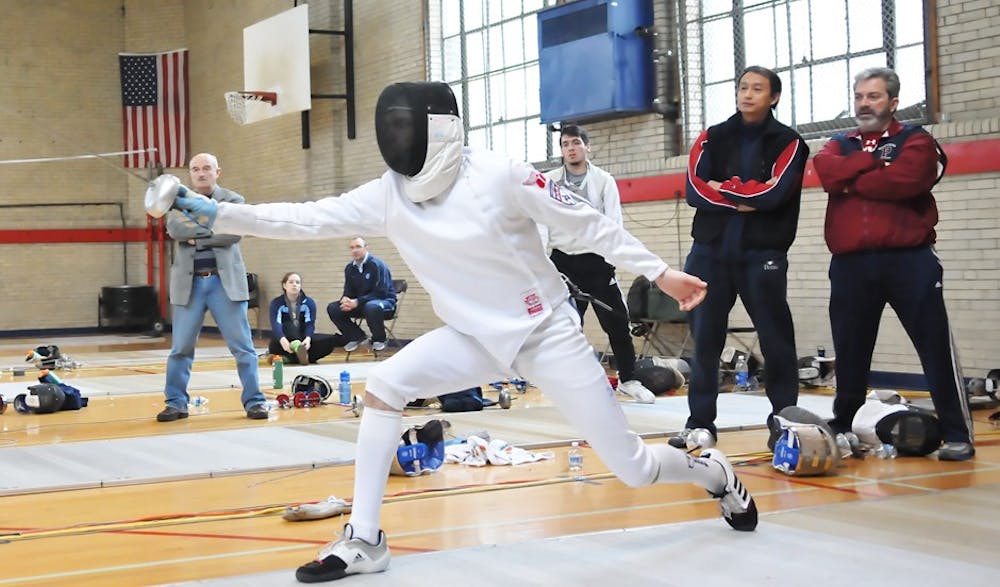
He comes from Thornville, Ohio.
That’s all you need to know about Randy LeMaster before realizing he’s unusual in fencing. The two other Penn coaches — head coach Andy Ma and assistant Mickey Zeljkovic — are foreign national champions; LeMaster took up the sport in his thirties and is from a town of 650 people and one stoplight.
Now middle-aged with a graying beard, his presence as an assistant coach since last season marks the newest chapter of a quixotic journey that has taken him from a blue collar town to coaching for one of the most elite fencing teams in the nation, with several fascinating pit stops along the way.
LeMaster’s story starts in 1983, when he was 19 years old. The country was in a tough recession and he had just gotten laid off from his job, so he decided to join the Navy.
“It was a way to provide for myself,” he recalled.
During this period, LeMaster traveled the world, visiting the Arctic Circle, the equator, the Mediterranean and Beirut twice (both times to deal with the aftermath of the 1985 Trans World Airlines hijacking). His specialty was weapons systems, and he was trained on everything from pistols to enormous artillery cannons. He’s reserved about this period of his life, and says some of his work was secretive.
LeMaster served on the USS Saipan for four and a half years, and there were times in which he didn’t see land for 47 days.
“When you have a lot of time on board a ship, you have a lot of downtime,” he explained.
A high school wrestler, LeMaster supplemented his free time by taking up boxing, which he learned from a shipmate. It was a way to kill time, but also a new endeavor consistent with the personality of a man always looking to move forward.
“You only find out what your limitations are when you test yourself and this was one of the ways that I tested myself,” LeMaster said.
The sport helped him learn about himself, specifically that he was a hard puncher and his thick head could take a lot of damage. In his first nine fights, he went undefeated.
The tenth match was critical; if he won, he would travel to San Diego to fight for the U.S. Naval team. His opponent was 6-foot-4 and 175 pounds, with a reach on each arm seven inches longer than LeMaster’s. His opponent jabbed at him throughout the fight, steadily wearing him down. Then the opponent hit LeMaster with an uppercut into his right eyeball, which began to oscillate. The ref called the fight. LeMaster’s professional boxing career was over, but for the next 18 months, he worked his first job as a coach for his ship’s boxing team.
When LeMaster got out of the Navy, he first worked as a deputy sheriff in Carter County, Fla., before falling back on his service training and taking a job in automation. He was still sparring with a friend from work, but at age 30, the brutal sport was beginning to wear on him.
“I realized I was getting too old to get punched in the face all the time,” LeMaster said. “I was looking for an intense one-on-one combat sport.”
His nephew was taking fencing lessons, and LeMaster decided to take up the sport.
As he fenced more, his skill increased and, by the time he injured his left hand at work, the game was so ingrained in his brain that he could switch his fencing arm and continue training. During this period, he began giving lessons to younger fencers at his club 45 minutes away from home.
A group of mothers in Naples, Fla. — where LeMaster lived and worked — asked him to teach fencing to a class of 10 kids once a week. Before he knew it, the group of 10 turned into 40, and one night a week turned into three. Soon enough, LeMaster’s off-time hobby had become a full-time obsession, and he decided to open his own club.
“[Fencing] had become a very strong passion in my life at this time,” he said.
Fully entered into the fencing world, he was now attending coaches’ training seminars and connecting with others in the fencing community. At one of these camps, he was trained by Dave Micahnik, the legendary Penn head coach who retired three years ago. Micahnik was impressed by LeMaster’s work ethic and hired him for a camp.
In 2009, when Andy Ma took over as head coach, he hired LeMaster to work at a camp, then as an interim coach and eventually as a full-time assistant.
LeMaster, who had been coaching full-time since 2001, sold his club in Naples and moved to Philadelphia, where he continues to be enamored with his job.
“People ask me, ‘You can make a living being a fencing coach?’” he said. “And I’m like, ‘Yeah, and it sure beats having a real job.’”
He feels his background has given him a “personal philosophy” that’s been useful in his job.
“I think being an outsider does help,” LeMaster explained.
He attributes his perspective to a life-long love of sport, but it’s as much aligned with the military edicts of honor and pride as it is with athletics.
“All winning streaks come to an end,” he explained. “But when you quit on yourself, stop trying, that’s when you get beaten.”
The Daily Pennsylvanian is an independent, student-run newspaper. Please consider making a donation to support the coverage that shapes the University. Your generosity ensures a future of strong journalism at Penn.
DonatePlease note All comments are eligible for publication in The Daily Pennsylvanian.





